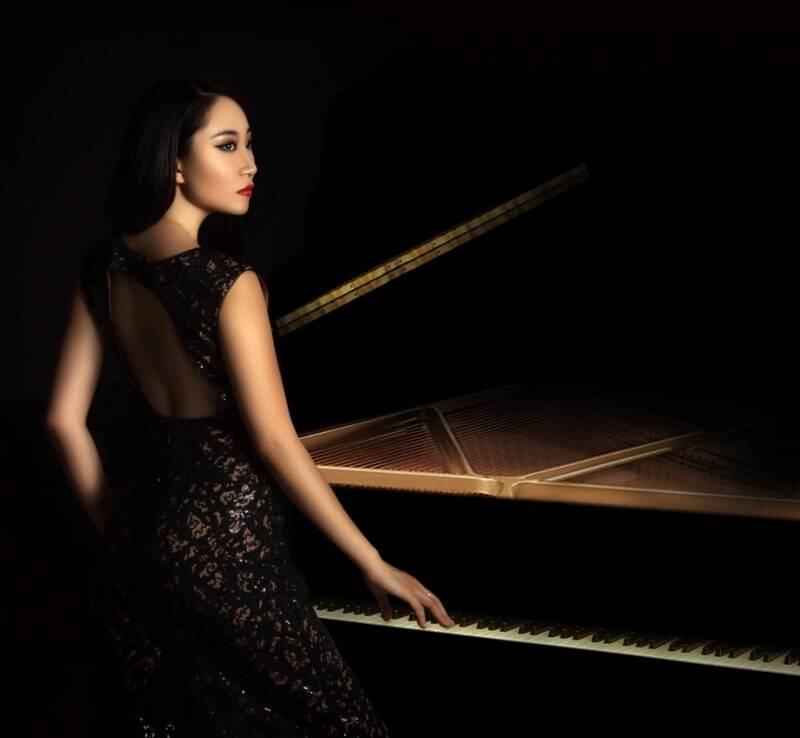Vashon Center for the Arts will present its 2nd annual Piano Fete from July 5-8, in the art center’s Kay White Hall.
The festival, with four acclaimed virtuoso pianists and two pianos, has been curated by Vyacheslav Gryaznov — better known to island fans as Slava — who made his Vashon debut in 2018. The series will feature Gryaznov, Konstantin Soukhovetski, Rexa Han, and Katya Kramer-Lapin.
In advance of Piano Fete, The Beachcomber is presenting a series of interviews with all four pianists, conducted by islander Michael Tracy. Tracy is a local musicologist and trusted advisor for VCA’s curation of classical music programs. This week, Tracy spoke to Rexa Han. — Elizabeth Shepherd, Editor
From Beijing to New York City, and now in Miami, you have lived in quite different worlds and cultures, yet music is often universal, with no boundaries. Has that been your experience or are there big differences in schools/pedagogy, approach to performances, and audiences?
That is a very great question, Michael. I have spent most of my life in these three cities – Beijing, New York, and Miami. I have to say each city brought me a very different perspective and experience. I spent my teenage years in Beijing attending Central Conservatory, spending most of my time practicing and training.
I came to New York at age 17 and it was a big shock, not only because of the culture and language, but I had to decide most things on my own, even though I had lived by myself away from my parents since age 12. I was encouraged to form my own aesthetic and taste in music playing.
I realized my inspiration came much more beyond piano. New York is the center of the world, and it is so unique to me as it has everything packed into this little Manhattan Island — museums, concert halls, galleries, exhibitions, fashion shows, countless restaurants, people of all backgrounds, etc. I experienced a great deal of culture in NYC, and I feel very fortunate to spend my early adulthood there. New York was critical in the development of my piano playing.
Miami is very different. To me, Miami was always a vacation spot. I never thought I would move down here, but I am attracted to the palm trees and beaches. I came here mainly because of my mentor, Maestro Santiago Rodriguez. Besides being an incredible pianist, he is a most amazing human being and teacher. He showed me the sensitivity to oneself and others. A sensitive mind, and a sensitive heart, is essential in making music. Music is the truth, nothing more, nothing less.
Previously my teachers were serious authorities. Maestro Rodriguez completely changed that view. He is always respectful and humble to all his students and an excellent listener. Rodriquez shares his views as another interpretation or alternative that allows students to present different perspectives so and their own interpretations. I find positivity and encouragement motivates students. I have since then followed his path to hopefully inspire many others.
Your program on Friday, July 7, starts with English Renaissance composer William Byrd, then the father of opera Claudio Monteverdi, to the great Baroque composer J.S. Bach, then fast forward to 20th century’s great jazz pianist/composer Bill Evens, jazz pianist Michel Camilo and then, Junsheng Zheng’s composition, written specifically for you. Is there a common thread among them?
The first half of my program reflects my recently released album titled “Déjà Vu,” which is a collection of 19 miniature pieces composed by 13 composers from 11 different countries across a period of five centuries, from the 16th century to the 21st. My goal is to bring an unforgettable experience by traveling through places without time and boundaries. The concept of my album is to present three important senses: smell, sight sound that trigger a memory or a moment of déjà vu. All the pieces are memories somewhere, sometime in my life.
My program at VCA is eight works, composed by eight composers, from eight different countries. This is the experience I am presenting, a way to travel through time and space without limitation.
Correction: In the print edition of the June 22 Beachcomber and an earlier online version of this article, the headline of the article misspelled Rexa Han’s last name. It is Han, not Hall. We strive for accuracy and regret the error.


